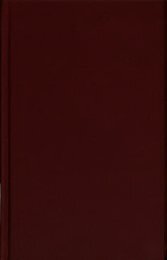Country Profile: Cuba - American Memory - Library of Congress
Country Profile: Cuba - American Memory - Library of Congress
Country Profile: Cuba - American Memory - Library of Congress
Create successful ePaper yourself
Turn your PDF publications into a flip-book with our unique Google optimized e-Paper software.
<strong>Library</strong> <strong>of</strong> <strong>Congress</strong> – Federal Research Division <strong>Country</strong> <strong>Pr<strong>of</strong>ile</strong>: <strong>Cuba</strong>, September 2006<br />
supposed to mark the beginning <strong>of</strong> an era <strong>of</strong> reform, their revolution failed. Batista (president,<br />
1940–44; dictator, 1952–59) and the military emerged as the arbiters <strong>of</strong> <strong>Cuba</strong>’s politics, first<br />
through de facto ruling and finally with the election <strong>of</strong> Batista to the presidency in 1940.<br />
The end <strong>of</strong> the early Batista era during World War II was followed by an era <strong>of</strong> democratic<br />
government, respect for human rights, and accelerated prosperity under the inheritors <strong>of</strong> the 1933<br />
revolution—Grau San Martín (president, 1944–48) and Carlos Prío Socarrás (president, 1948–<br />
52). Yet political violence and corruption increased. Many saw these administrations <strong>of</strong> the<br />
<strong>Cuba</strong>n Revolutionary Party (Partido Revolucionario <strong>Cuba</strong>no—PRC), more commonly known as<br />
the Authentic Party (Partido Auténtico), as having failed to live up to the ideals <strong>of</strong> the revolution.<br />
Others still supported the Auténticos and hoped for new leadership that could correct the vices <strong>of</strong><br />
the past. A few conspired to take power by force.<br />
The Rise <strong>of</strong> Fidel Castro: Batista’s coup d’état on March 10, 1952, had a pr<strong>of</strong>ound effect on<br />
<strong>Cuba</strong>n society, leading to doubts about the ability <strong>of</strong> the <strong>Cuba</strong>ns to govern themselves. It also<br />
began a brutal right-wing dictatorship that resulted in the polarization <strong>of</strong> society, civil war, the<br />
overthrow <strong>of</strong> Batista, and the destruction <strong>of</strong> the military and most other <strong>Cuba</strong>n institutions. Fidel<br />
Castro Ruz, a charismatic, anti-U.S. revolutionary, seized power on January 1, 1959, following<br />
his successful revolt against the U.S.-backed Batista government. As the Castro regime<br />
expropriated U.S. properties and investments and began, <strong>of</strong>ficially, on April 16, 1961, to convert<br />
<strong>Cuba</strong> into a one-party communist system, relations between the United States and <strong>Cuba</strong><br />
deteriorated rapidly. The United States imposed an embargo on <strong>Cuba</strong> on October 19,1960, and<br />
broke diplomatic relations on January 3, 1961, in response to Castro’s expropriations without<br />
compensation and other provocations, such as arrests <strong>of</strong> U.S. citizens. The failure <strong>of</strong> the Central<br />
Intelligence Agency (CIA)–sponsored invasion by <strong>Cuba</strong>n exiles in April 1961 (the infamous Bay<br />
<strong>of</strong> Pigs invasion) allowed the Castro regime to destroy the entire <strong>Cuba</strong>n underground and to<br />
emerge strengthened and consolidated, basking in the huge propaganda value <strong>of</strong> having defeated<br />
the “Yankees.”<br />
The Cold War Period: Tensions between the two governments peaked during the <strong>Cuba</strong>n<br />
Missile Crisis <strong>of</strong> October 1962 after the United States revealed the presence <strong>of</strong> Soviet missiles in<br />
<strong>Cuba</strong>. Following the imposition <strong>of</strong> a U.S. naval blockade, the weapons were withdrawn and the<br />
missile bases dismantled, thus resolving one <strong>of</strong> the most serious international crises since World<br />
War II. A U.S.-Soviet agreement that ended the <strong>Cuba</strong>n Missile Crisis assured <strong>Cuba</strong>’s protection<br />
from military attack by the United States.<br />
<strong>Cuba</strong>’s alliance with the Soviets provided a protective umbrella that propelled Castro onto the<br />
international scene. <strong>Cuba</strong>’s support <strong>of</strong> anti-U.S. guerrilla and terrorist groups in Latin America<br />
and other countries <strong>of</strong> the developing world, military intervention in Africa, and unrestricted<br />
Soviet weapons deliveries to <strong>Cuba</strong> suddenly made Castro an important international contender.<br />
<strong>Cuba</strong>’s role in bringing to power a Marxist regime in Angola in 1975 and in supporting the<br />
Sandinista overthrow <strong>of</strong> the dictatorship <strong>of</strong> Nicaragua’s Anastasio Somoza Debayle in July 1979<br />
perhaps stand out as Castro’s most significant accomplishments in foreign policy. In the 1980s,<br />
the U.S. military expulsion <strong>of</strong> the <strong>Cuba</strong>ns from Grenada, the electoral defeat <strong>of</strong> the Sandinistas in<br />
Nicaragua, and the peace accords in El Salvador and Central America showed the limits <strong>of</strong><br />
3



![Albert Einstein Papers [finding aid]. Library of Congress. [PDF ...](https://img.yumpu.com/21604228/1/190x245/albert-einstein-papers-finding-aid-library-of-congress-pdf-.jpg?quality=85)





![American Colony in Jerusalem Collection [finding aid]. Library of ...](https://img.yumpu.com/17941275/1/190x245/american-colony-in-jerusalem-collection-finding-aid-library-of-.jpg?quality=85)



![Piccard Family Papers [finding aid]. - American Memory - Library of ...](https://img.yumpu.com/17941234/1/190x245/piccard-family-papers-finding-aid-american-memory-library-of-.jpg?quality=85)


